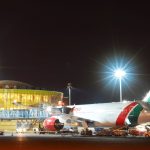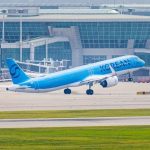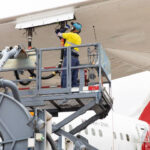Pratt & Whitney Canada (P&WC) is restarting activity on its hybrid-electric propulsion technology with the aim of ground testing a de Havilland Dash 8-100 equipped with a demonstration powerplant in 2022, leading to flight testing in 2024. The project is being backed as part of a C$163 million ($129 million) investment supported by the governments of Canada and Quebec, and is a component of the country’s green recovery plan, reports Mark Pilling. P&WC’s announcement is the second sustainability initiative launched in Quebec in the past week, with Airbus joining the SAF+ Consortium, a group of aerospace companies and research institutions that is seeking to transform Montreal into a sustainable aviation hub in North America. The group is aiming to produce aviation fuel from a pilot power-to-liquid plant from captured CO2 using renewable green hydrogen later this year, with a commercial project planned for 2025.
P&WC is working with De Havilland Canada to integrate hybrid-electric technology into a Dash 8-100 with an advanced electric motor and controller from Collins Aerospace. Both P&WC and Collins are part of Raytheon Technologies. This project succeeds the so-called Project 804, launched in 2019 as a joint development programme between P&WC and Collins “and provides a solid foundation for this new demonstrator programme to build upon,” said P&WC. The Dash 8-100 is a twin-turboprop seating 37 passengers.
“Hybrid-electric technology has an important role to play in enabling the next step-change in efficiency for aircraft engines, and we are uniquely positioned to demonstrate this potential,” said Maria Della Posta, President, P&WC. The new hybrid-electric propulsion technology will drive significant improvements in aircraft efficiency by optimising performance across the different phases of flight, allowing the demonstrator to target a 30% reduction in fuel burn and CO2 emissions, compared to a modern regional turboprop airliner, said P&WC.
Added Dave Riggs, Chief Transformation Officer at De Havilland Canada: “Our company has a legacy of innovation that has supported aviation in Canada and around the world for more than 90 years and we are immensely proud to be the first manufacturer of regional aircraft supporting the development of hybrid-electric propulsion technology. We look forward to collaborating with Pratt & Whitney Canada and governments in Canada to further the development of alternative, climate-friendly technology that holds much potential to contribute to more sustainable aviation.”
François-Philippe Champagne, Canada’s Minister of Innovation, Science and Industry stated: “The aerospace sector is a pillar of the Canadian economy, providing good jobs for Canadian workers from coast to coast. It’s essential that we support the long-term growth of the sector and help make Canada a world leader in greener, more innovative technologies.”
Another major aerospace manufacturer, Airbus, has signed a memorandum of understanding (MoU) to collaborate with Canadian aviation industry players on SAF development and production in North America. It will join the SAF+ Consortium, a partnership that is aiming to build a power-to-liquid (PtL) pilot plant in the east end of Montreal. SAF+ is a group of Quebec companies and research institutions working in the SAF field focusing on capturing CO2 from large industrial emitters and synthesising with green hydrogen to produce e-fuels for the aviation sector with 80% lower lifecycle GHG emissions than their fossil-based equivalent. SAF+ said it intends to start production as early as the second half of 2021 at the pilot plant. A commercial project with an output of 30 million litres per annum is planned for 2025.
Airbus will be investing through “in-kind” contributions, which it says will consist of technical and certification expertise, economic analysis, communications and advocacy. “The announcement marks the launch of a new Canadian ecosystem dedicated to stimulating the production of SAF and connecting Airbus with prominent Canadian actors spanning the entire aviation value chain to develop a concrete solution that will make low carbon flying a reality,” said the European aerospace giant.
Its New Energy Programme Manager, Steven Le Moing, continued: “Building this new Canadian ecosystem alongside the SAF+ Consortium is a key milestone as we continue to push to reach our global 2050 CO2 emissions reduction targets. This partnership is a perfect example of how Airbus is actively shaping decarbonisation discussions in North America, while demonstrating our commitment to making SAF an economically viable solution available to our customers.”
The consortium’s President, Jean Paquin, said: “SAF+ aims to be a pioneer in the field of SAF, and with the support of visionary partners such as Airbus, we will create a competitive company, able to offer one of the many technological solutions needed to decarbonise the aviation industry.”
The consortium brings together several key players including Air Transat, Hydro-Quebec, Aéroports de Montréal, Polytechnique Montréal and Aéro Montréal. In July 2020, all-Airbus fleet operator Air Transat became the first Canadian airline to commit to a major SAF offtake following an agreement with SAF+.
Image: Pratt & Whitney Canada















More News & Features
African Development Bank and Japanese industrialist unite to explore SAF production in Africa
LanzaJet and KMG agree to progress SAF production project in Kazakhstan
SkyNRG says e-SAF and carbon removals should not be competing strategies for aviation decarbonisation
South Korea announces mandatory SAF blending for departing international flights from 2027
Catagen launches SAF production company and signs offtakes with Ryanair and Shell
US rebukes ICAO for wasting resources on climate financing initiatives and warns against global levies